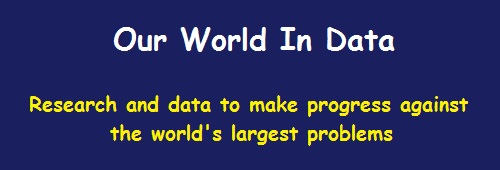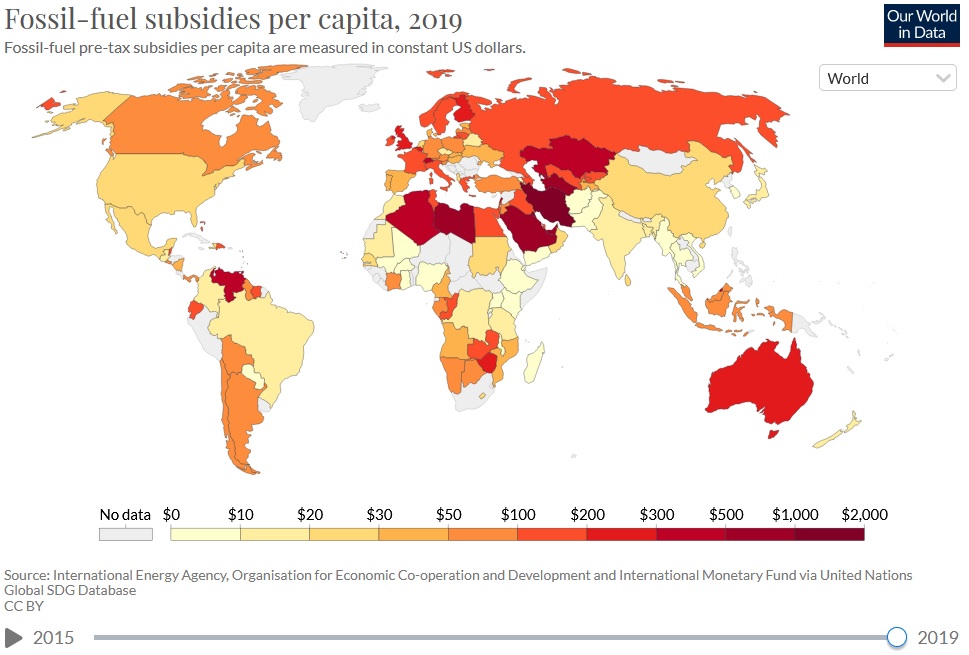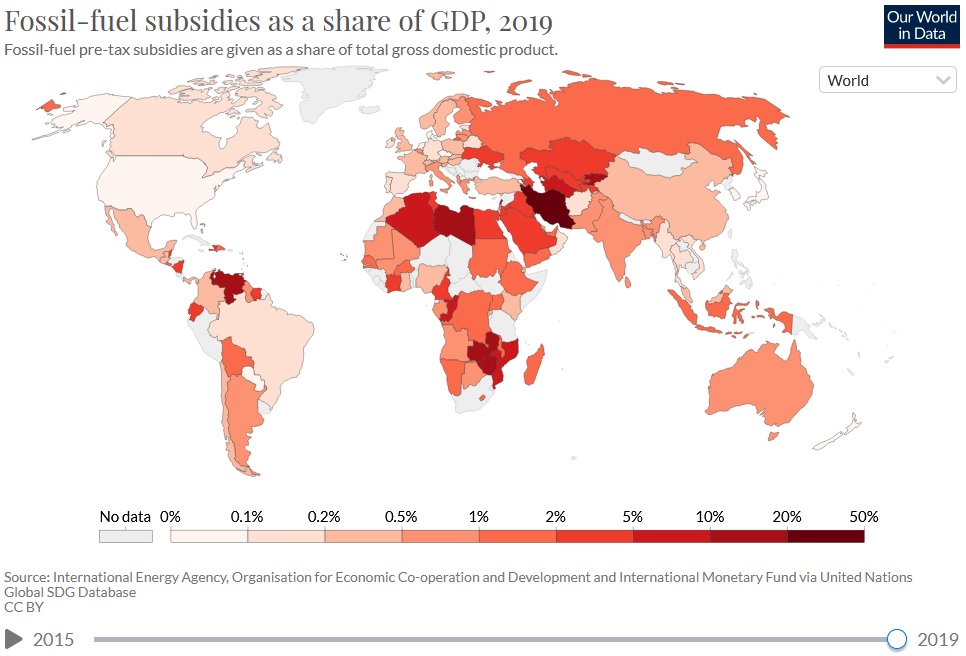
|
Mother Pelican
A Journal of Solidarity and Sustainability
Vol. 17, No. 12, December 2021
Luis T. Gutiérrez, Editor
|
|
|
|

|
|
|
Fossil Fuel Subsidies:
If We Want to Reduce Greenhouse Gas Emissions
We Should Not Pay People to Burn Fossil Fuels
Max Roser
This article was originally published by
Our World in Data, 3 November 2021
REPUBLISHED WITH PERMISSION
 3285 charts across 297 topics. All free: open access and open source.
3285 charts across 297 topics. All free: open access and open source.
|
|
Instead of making fossil fuels more expensive many governments do the opposite. They subsidize them. Having access to reliable and affordable energy is important to people, so it’s understandable that governments support energy access. But if these subsidies support the consumption of fossil fuels it comes with a large downside, air pollution and accelerated climate change. The extent of fossil fuel subsidiesCountries around the world agreed to reduce fossil fuel subsidies. It is one of the Sustainable Development Goals (SDGs) that they want to reach by 2030. The maps here show two indicators to track this goal. They are part of our SDG-Tracker where you find all of the available measures to track the SDGs. In many countries fossil fuel subsidies are extremely high. The New York Times reports that in Venezuela subsidies were so high that “a dollar could once theoretically buy about 5 billion gallons of gasoline.” This would be “more than enough to supply the state of Michigan for a year.” Venezuela was an extreme case. But as the map shows there are many countries with very large subsidies: several are higher than $100 per person per year. In others, it’s higher still. They can also be very large compared to other public expenditures. In many countries energy subsidies exceed the entirety of their social safety net expenditures many times over.1 For poorer countries they are often a major expense – up to 16% of GDP in Zimbabwe and 21% of GDP in Iran as the map shows.

Click the image to access a larger image with analysis options.

Click the image to access a larger image with analysis options.
Repealing subsidies is not easy, but it is possible – and the world is slowly making progressFor political leaders the attractiveness of fuel subsidies is obvious. Access to cheap energy is important to people and subsidies are a very visible way of government support. Subsidies, once they are established, are very hard to get rid of.2 Billions of the poorest people in the world do not have access to modern sources of energy. Four out of ten people in the world – that’s 3 billion – do not have access to clean, modern energy for cooking. They have to cook and heat with wood, crop waste, charcoal, coal or dried dung. Millions die every year from indoor air pollution as a result, as I wrote in this essay on energy poverty. Fossil fuel subsidies are expensive and environmentally disastrous. But because energy access is so crucial the solution is not as simple as just repealing these subsidies. If they cannot access fossil fuel energy, they need substitutes. To end the subsidies that sustain the consumption of fossil fuels we need to make energy from clean sources affordable. Whether industry and private individuals choose energy from fossil fuels or from clean alternatives is largely decided by their price. To transition away from fossil fuels to clean sources, the clean alternatives need to be cheaper. The fact that fossil fuels are subsidised makes this transition much harder. Clean alternatives don’t just have to be cheaper than fossil fuels, they need to be cheaper than fossil fuels with subsidies. As so often with progress, the world rarely solves a problem through a single event. Repealing subsidies is a process. The good news is that there are several countries that are making progress and that others can learn from. Indonesia – home to 270 million people and a country with a major oil industry – is one of them. Researchers Beaton, Lontoh, and Wai-Poi (2017) show how the country overcame the political obstacles to gasoline and diesel subsidy reforms and focus on the reforms after the 2014 price hike. They emphasize the virtuous circle that can take place between subsidy reforms and investments in social assistance capacity.3 The data in the charts above shows that Italy, Ukraine, and Thailand are also examples of countries that have recently reduced subsidies. Research beyond the case of Indonesia shows that a transition can be achieved when the freed up fiscal resources are used for targeted support for those that need it.4 Is the world as a whole making progress towards this goal? Are the world’s governments paying people less to burn fossil fuels? Yes. Ross and colleagues find that since 2003 subsidies have declined, but this progress is slow.5 We have made some progress, but a lot more is possible. It’s also urgently needed. Many governments are failing to make use of one of the most cost-effective policy options to reduce greenhouse gas emissions.
Continue reading:In this article I focused on explicit subsidies. Implicit subsidies are those cases when producers and consumers cause damage, but do not have to pay a monetary price for it. For fossil fuel consumption these implicit subsidies are extremely large. In my article ‘The argument for a carbon price’ I focus on implicit subsidies.
Endnotes
-
Foreword by Ana Revenga in Gabriela Inchauste and David G. Victor [Editors] (2017) – The Political Economy of Energy Subsidy Reform. World Bank. There is a depressing, but important research literature that aims to explain just why these subsidies are so popular. See
Kyle J. (2018) – Local Corruption and Popular Support for Fuel Subsidy Reform in Indonesia. Comparative Political Studies. 2018;51(11):1472-1503. doi:10.1177/0010414018758755
Cheon, A., Urpelainen, J., Lackner, M. (2013). Why do governments subsidize gasoline consumption? An empirical analysis of global gasoline prices, 2002-2009. Energy Policy, 56, 382-390. Christopher Beaton, Lucky Lontoh, and Matthew Wai-Poi (2017) Indonesia: Pricing Reforms, Social Assistance, and the Importance of Perceptions in Gabriela Inchauste and David G. Victor [Editors] (2017) – The Political Economy of Energy Subsidy Reform. World Bank.See also the IISD’s 53 Ways to Reform Fossil Fuel Consumer Subsidies and Pricing. On this see “Bacon, Robert; Bhattacharya, Soma; Kojima, Masami (2010) Expenditure of Low-Income Households on Energy : Evidence from Africa and Asia. Extractive industries and development series;no. 16. World Bank. For an assessment of whether or not the world is making progress or not on fuel taxes and subsidies see Ross, M. L., Hazlett, C. & Mahdavi, P. (2017) – Global progress and backsliding on gasoline taxes and subsidies. Nat. Energy 2, 16201. They study the period from 2003 to 2015.
|
ABOUT THE AUTHOR
Max Roser is the founder and director of Our World in Data. He began the project in 2011 and for several years was the sole author, until receiving funding for the formation of a team. Max’s research focuses on poverty, global health, and the distribution of incomes. He is also Programme Director of the Oxford Martin Programme on Global Development at the University of Oxford, and Co-executive Director of Global Change Data Lab, the non-profit organization that publishes and maintains the website and the data tools that make our work possible.
|
|Back to Title|
LINK TO THE CURRENT ISSUE
LINK TO THE HOME PAGE
|
|
|
|
"The scientifically necessary is politically unfeasible,
the politically feasible is scientifically irrelevant."
William Rees (b. 1943)
|
|
Page 8
|
|
FREE SUBSCRIPTION
|
![[groups_small]](groups_small.gif)
|
Subscribe to the
Mother Pelican Journal
via the Solidarity-Sustainability Group
Enter your email address:
|
|
|
|